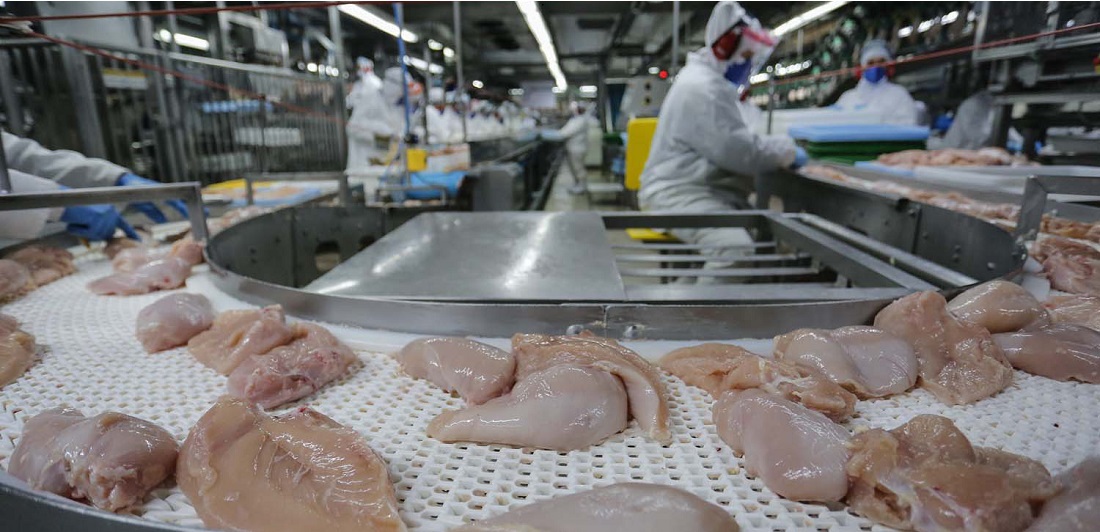
Brazilian poultry eager to gain access to more markets in Africa
Sep, 13, 2023 Posted by Gabriel MalheirosWeek 202338
Following the successful entry into the Israeli market secured by the Brazilian poultry industry, Africa, with its nearly 1.4 billion inhabitants, is set to be the sector’s next focal point. This initiative is a joint effort between the Brazilian Association of Animal Protein (ABPA) and the Brazilian Trade and Investment Promotion Agency (ApexBrasil).
Securing a greater presence for Brazil in African markets is one of the goals of the recently renewed sector promotion agreement for poultry and swine farming between ABPA and ApexBrasil. Both entities anticipate over $4 billion (approximately R$20 billion) in directly impacted business over two years.
Among the countries targeted for exports, Nigeria and Senegal, which are still unreachable to Brazilian poultry, are considered priorities for commercial diplomacy.
“Brazil has been absent from Africa in recent years, but we are returning with strength now,” says Jorge Viana, President of ApexBrasil.
Nigeria
Nigeria is the largest market in Africa that still hasn’t opened its borders for Brazilian chicken. With a population of over 213 million and a Gross Domestic Product (GDP) of approximately $450 billion in 2022, Nigeria ranks as Africa’s largest economy and is the 31st largest economy globally, surpassing even South Africa.
According to ABPA, Nigeria’s average chicken consumption per capita is about 2.5 kg/year. However, the country’s chicken production is approximately 454,000 tons per year.
“Nigeria is the most populous country in Africa and is on track to become one of the largest countries in the world in terms of its population. It has a large consumer market demanding proteins,” explains Ricardo Santin, President of ABPA. He also adds that the low per capita chicken consumption in Nigeria indicates pent-up demand that is likely to grow as the population’s per capita income increases.
Additionally, Nigeria is home to one of the world’s largest Muslim populations, presenting significant potential for halal products (produced in accordance with Islamic dietary laws).
Senegal
With a population of nearly 17 million, Senegal faces various cases of avian influenza and has a low consumption rate of only 5 kg per capita annually. Senegal’s chicken production is about 130,000 tonnes per year, according to ABPA.
Santin views Senegal as an emerging market that, like Nigeria, has growth potential in per capita consumption. “Senegal is already a partner in Brazilian poultry genetics, and we see the potential to strengthen the business in finished products as well,” he notes.
O gráfico abaixo compara as exportações totais de carne de saves do Brasil para o continente africano, incluindo todos os países, entre janeiro de 2019 e julho de 2023. Os dados são do DataLiner.
The chart below compares YTD poultry exports from Brazil to the African continent, including all countries, between Jan 2019 and July 2023. The data is from DataLiner.
YTD Poultry exports to Africa | 2019 – 2023 | TEU
Source: DataLiner (click here to request a demo)
Other Markets
However, more than conquering new markets, ABPA and ApexBrasil’s primary concern is guaranteeing sales to countries that are already open to Brazilian products but are not engaging in business.
“Brazil is already in 160 markets worldwide, and few are left. But we have open markets like India, Bangladesh, and Pakistan, where we are not selling due to tariff issues. For example, we can sell there for India, but the tariff on our product is 100%,” comments Santin.
Avian Influenza
Chicken exporters are also optimistic about importers’ decisions to review current standards for embargoes in cases of diseases such as avian influenza in domestic or industrial poultry production.
One example is Japan, which had temporarily suspended the purchase of chicken and eggs from Santa Catarina and Espírito Santo due to the detection of avian influenza in both states.
In July, the Japanese government agreed to Brazil’s request to restrict embargoes only to municipalities where avian influenza outbreaks were detected rather than entire states.
“More than 70% of the sanitary certificates from importing countries have already been updated, allowing for the possibility of more localized embargoes,” says Santin.
According to the President of ABPA, some markets, such as South Africa, Mexico, Tajikistan, and other smaller markets, still have not made this change in protocols. In the case of Mexico, President Luiz Inácio Lula da Silva is scheduled to visit the country in September, where this issue is likely to be addressed.
Small Exporters
ApexBrasil and ABPA are also working with the Brazilian Support Service for Micro and Small Enterprises (Sebrae) to promote the export of animal protein from small businesses and cooperatives. “We want to increase the number of exporters and provide opportunities for those who dream of exporting but don’t know how,” says Jorge Viana.
Ricardo Santin explains that support for new exporters will focus on the Northeast and North regions of the country, which have low representation in Brazilian exports of poultry and pork.
In 2022, according to ABPA, the Northern and Northeastern states represented only about 0.30% of the 4.822 million tons of chicken exported.
Source: Globo Rural
To read the original news piece, visit: https://globorural.globo.com/pecuaria/aves/noticia/2023/09/brasil-busca-abertura-de-mercados-na-africa-para-a-carne-de-frango.ghtml
-
Fruit
Oct, 22, 2020
0
Brazilian orange juice exports fell 26% in Q1 of 2020/21 season
-
Other Cargo
Jun, 23, 2022
0
Fertilizer imports from Russia steady and growing
-
Sugar and Ethanol
Apr, 04, 2023
0
Vessel line-up in Brazil indicates 1.152 mt of sugar exports
-
Other Cargo
Dec, 21, 2023
0
Papermakers cut production in face of rising imports


